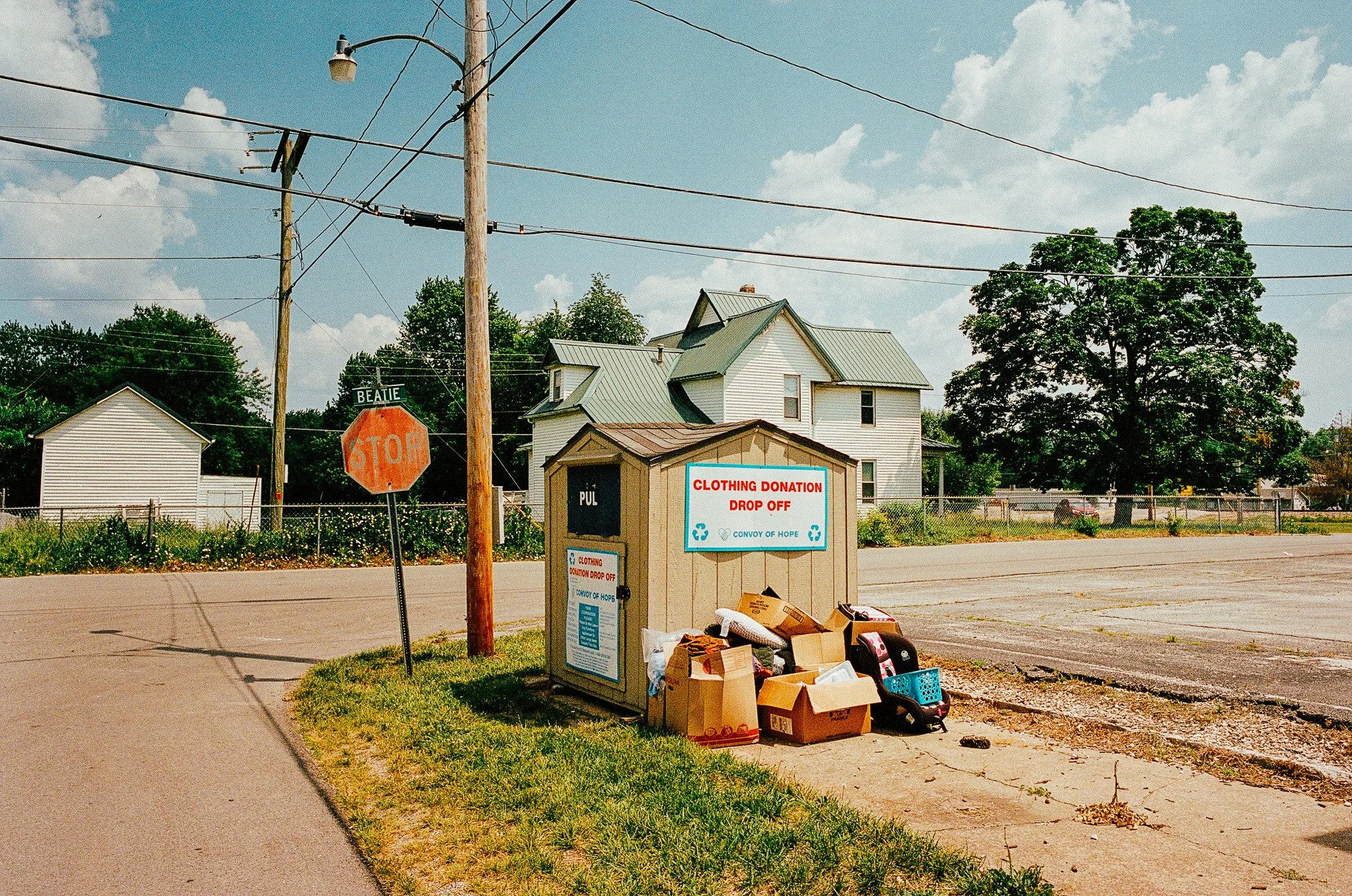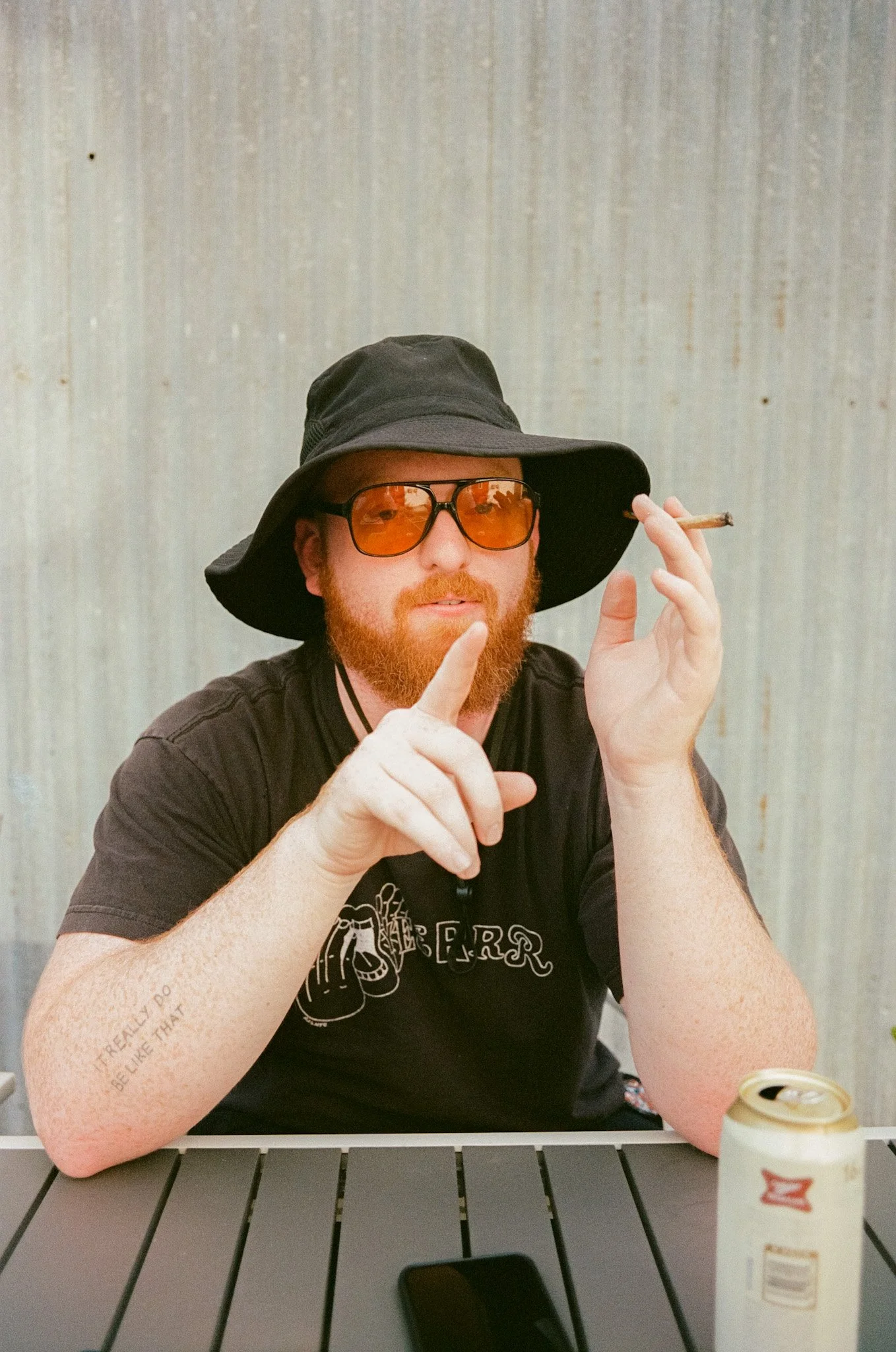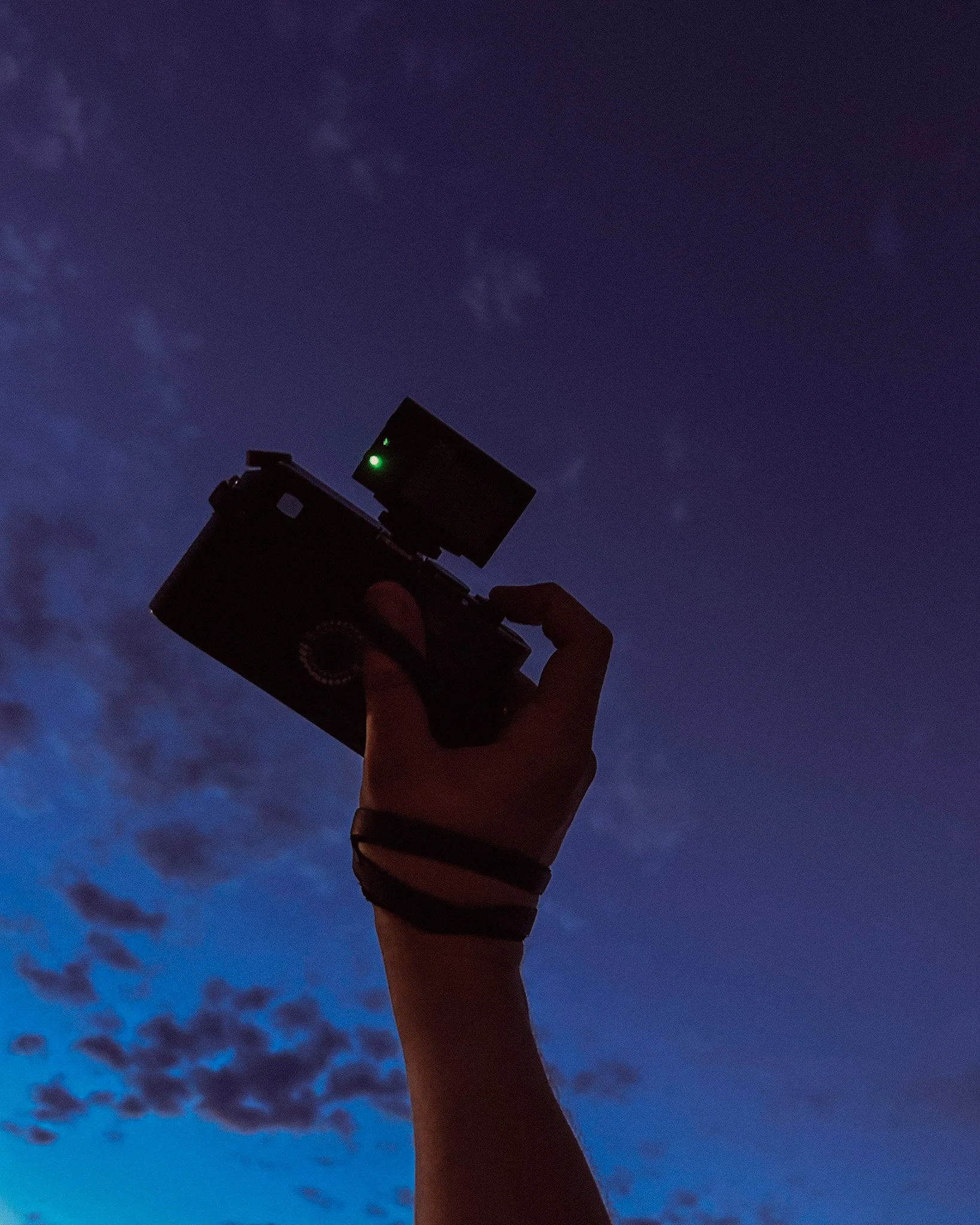THE RIVER AND THE FLAME
My bare feet collected the faint dark grit of asphalt as my Leica film camera bobbed against my hip on the way to a small-town budget store. The Hanes T-shirt, once unblemished and folded in a similar urban establishment, now lacked sleeves and bore the stains of multiple oil changes. An absence of tan lines and a pair of khakis cut into shorts completed my Sunday best attire for what would become a favorite Friday night—one that carried more truth than I was prepared to know. A sold-out, forlorn Redbox sat catty-corner in the late-day sun, begging for shade. As I neared the entrance, an AC unit panted in sync with the fingerprint-smeared doors. Inside was dark, dim. The aisles glared with packaging—unnatural dyes, neon drinks stacked to the ceiling. I looped through the building to find a simple pack of batteries. All I needed was one to get my flash working. Everything else felt like another petroleum byproduct waiting to make someone rich. I figured the staff wouldn’t take kindly to my disheveled fit—shoeless, butchered T-shirt, shirking what few social norms anyone still cared about. But they didn’t. The self-checkout absorbed the burden of small talk while the clerks scrolled their phones. Within seconds, the doors closed behind me, and I walked back toward the faded black SUV that had carried me here.
This was God’s country. Far-flung from the East Coast that raised me, and the West Coast I tried to claim before life parked me in this foreign-feeling middle ground. Nestled between farmlands and flash-flood warnings, crooked between the Arkansas border and the Kansas City Beltway, was Springfield—one of many buckles on the Bible Belt that led to the promised land of golf courses and restaurants in Branson. Despite being a recent convert to therapy, the ghosts of serial church-hopping reared loudly. I knew the weight of promises made and broken. I had seen cool dads aching for the next book tour, and tiny halls struggling to keep the lights on but feeding the homeless anyway. Military kids blame the government for uprooted friendships; I had no such excuse. My dad called mutt dogs “Virginia biscuit-eaters” because they were a little bit of everything in town. Standing again in a land with billboards advertising hell awakened every denomination still buried under my skin. The passenger door shut. I took a swig of canned tea.
Cameron: “About time.”
Me: “I know. Just needed to get the external flash working.”
Cameron: “The clouds are holding up, but this light’s incredible.”
Me: “Yeah. Roll’s loaded. Let’s catch this sunset on the road.”
Cameron, the driver, was from this empire. A thorough Missourian who had left, carried grit from the Northeast, and returned. We met in a café, introduced by the owner because we both carried cameras. Conversation was instant, marrow-deep. He talked about mutual connections; I explained how I landed here after a six-month road trip documenting America’s return to life. Our motivations aligned with uncanny precision. It was the same current I felt with artists across the country—unwelcome prophets, indifferent to clout, masterful at navigating nuance. They weren’t verified. They were real. Cameron walked that path. Around a farm road curve, I leaned out the window—hair blown back, camera pressed to my cheek. Frames burned fast as the horizon pulled us into fields and groves. Grey-blue pastels streaked beneath yellows; mustard light draped over green. Inside again, I rewound the roll and laughed as Cameron rattled off the virtues of digital. Gravel cracked beneath the tires like a cut from a film, too old to name.
The rhythm of these nights became ritual, though no one called it that. Fire nights weren’t about monotony; they were about craving what couldn’t be scrolled. Our digital life mimicked mega-churches and high school hallways, cities ripping down old buildings for stores that wouldn’t last—selling at scale to a nation gluttoned with subscriptions and starved for closeness. The salve was simpler: bread, fire, laughter. Comfort uncommoditized. Not something pushing us forward, but pulling us back-to beginnings. As the ancients once did, folks from all over town began to arrive. Everyone carried food or drink of preference, and introductions repeated with the awkward pauses of early conversation. The awkwardness faded when people asked about the camera or volunteered their trades and hobbies. Some loved music, others cycling. Local musicians and entrepreneurs gave elevator pitches. Politics hung unspoken, touching every edge of the spectrum. Still, an air of freedom lingered. No fresh haircuts signaling salvation. No smiles sharpened for revenue. For the first time since moving here, something was different.
The fire pit sat at the mouth of a trail Cameron had carved. It was a conduit as much as a gathering place. Once the guests settled, we filed single line through dense brush, bare feet brushing roots, two cats weaving between ankles like ushers leading us to a riverside revival. The trail wasn’t long, but long enough to sever electricity and let cicadas sing unbroken. I thought of Virginia—stories of baptisms not near pews but in wild waters. Stories colliding now with this procession of American spirits, vintage connoisseurs, and modern mullets, all wishing for induction into something sacred. Something real. Something not plagued by worship bands or contests of will. The river spread before us, patient and eternal. We rolled our jeans, stepped onto its smooth stone floor. Shoulders dropped in relief as the water claimed us. Little rapids snapped like oil in a skillet, welcoming potatoes. I glanced back toward the bank, where my camera lay more than six feet away, and let it rest. For once, water carried me without the burden to capture. Here I was with people who didn’t know my last name. Anonymity was enough to transcend the compulsion to document. Enough to feel the words and the colors rather than express them. We were many shades of the same person. Each of us had already shed the first face—the one we wear for parents, pastors, bosses. Some dared to drop the second, the one for lovers and peers. What remained was the third face, truest and hardest to reveal, reflected back in ripples and moonlight. The current folded around us, carrying fragments of self like leaves, and I could hear the oldest verse ever sung. The one humanity builds cathedral after cathedral to rediscover, only to end up back in a garden—back where collarbones and eyes are as divine as oak branches and river stones. I wanted to resist that truth, to complicate it, but it was simpler than my brain could bear. This last light of day and this river, likely never to cross my path again, were communion. Not the kind measured out by hands in linen gloves, but the kind that exists when you stop clutching. When you refuse to hold on. By the time my toes wrinkled, golden had given way to blue.
We gathered our things, retraced the trail toward the fire. Cats had vanished; thunder rumbled in the distance. Shoes squelched, stomachs growled, and conversations carried us. The fire returned us to warmth, cushions damp with rain, bags of Doritos passed like communion bread. Pizza arrived, and nothing could be more perfect. A gentle breeze captivated us, and sparks rose skyward like prayers.
This is heaven. This is a church. This is home.
Smoke stung my eyes as I wrestled with the paradox. Between the love of where I’d come from and the possibility now of roots with no history. Between how coal burns longer than leaves, yet holds more love. Between why rivers know more than pulpits. The predestination of going from burnt-out church kid to living artist was no longer an eclipse. It was happening right then and there, around this fire pit anyone could buy online. The fire dwindled, thunder rolled closer, and I couldn’t tell if I was leaving this night behind or carrying it with me forever. The cicadas still sang like a choir refusing dismissal, and the sparks rose upward as if unwilling to die. I realized the gospel doesn’t need drywall or rhinestones. It doesn’t need to be ordered at Lowe’s or assembled with screw guns and stage lights. It only needs fire and water—the elements that were here before us and will be here long after. No pastor can conjure them, no board can budget for them, no app can replicate them. They are God-given, stitched into the marrow of the earth, waiting for us to remember. Somewhere beyond the tree line, the sun would rise again, and the sunflowers would turn toward it, just as they always had. They don’t ask permission, don’t build programs, and don’t charge admission. They just obey the light. Maybe that’s the most welcoming church there is the one no man can build, only walk into. A place where the sermon is written in shadow and bloom, and the communion is whatever you’ve got in your hands: a can of tea, a bag of Doritos, a crust of pizza still warm from the gas station. I thought back on all the sanctuaries I had walked through, all the pulpits I had heard thunder. None of them stayed with me like this night would—the river’s current tugging at my legs, the laughter in the dark, the glow of faces around the fire. I had always thought the garden was behind me, locked in some childhood I could never return to. But maybe it had been waiting here all along, by a river in Missouri, with strangers who didn’t need to know my name. And perhaps that’s the point. Not that we build something flawless, but that we stumble into what was already here, unpolished and holy. That heaven has always been less of a strip mall and more a field. Less of a development program and more of a spark.
The artists I met along the way—Cameron that night, and others before and after—were proof that what once burned hollow could still be built out again. Their presence was its own kind of architecture: not walls or stages, but human reminders that the sacred never vanishes, it just waits for someone to notice. I can’t say that art is my gospel—but for me it’s an immortal conundrum. A wrestling match between the inhuman design of the universe and the comedy of carrying free will within it. A touching of the hip from an angel sent from high above, and proof that’s witnessable in these other humans. In Cameron, and these Missourians, and the many other artists I’d met between these two coasts. Their friendships modeled the steps to release me from what I’d inherited and bind me to everything I was still becoming. A fuller definition of my own name.
Years from now, I want to have a rich history of this. Not just of kinship and knowing some incredibly creative people, but of finding weary and wandering transplants the way I was, and avoiding thinking twice to welcome them. Invite them to my house, introduce them to friends new and old, and encourage us all to walk a trail toward a skinny, mystical river. Offer an introduction to something grand in the universe. We’ll wade into its arms, crack open something cold, and let the night write its liturgy of what takes place. Fire. Water. Communion. Sky. And the laughter of whoever gathers will echo and soar above the trees like the sparks of truth from that Missouri bonfire so many days into the past: as if they’ve been dancing for decades towards an eternity.











